Help desk software is a customer service platform that organizes all support requests in a single place. It helps agents respond faster, automates repetitive tasks, and gives managers insight into team performance.
Contrary to common belief, it’s not just for big companies.
Small businesses use it to stay responsive, even with lean teams. After all, customer experience is just as important as the product or service you offer. Especially as 88% of consumers agree that businesses are not competing purely based on the product provided, but also the overall shopping experience.
Implement Tidio’s help desk solutions for SMBs
Benefits of help desk software for small business
Help desks solve a big problem: chaos.
When small businesses grow, customer messages pile up fast. Emails, live chat, social media DMs, texts… you name it. Without the right ticketing system, support teams lose track of tickets, agents step on each other’s toes, and customers wait too long for answers.
Help desks fix that.
A highly functional customer service desk software optimized for a small business isn’t just about speed. It significantly reduces operational costs and optimizes customer acquisition costs, giving your business a competitive edge. It centralizes communication, tracks every customer request, and keeps agents productive.
Gartner highlights[1] that organizations are switching to help center software, self-service, and automation due to 3 main reasons:
- Lower operational costs
- Improved functionality
- Boosted efficiency
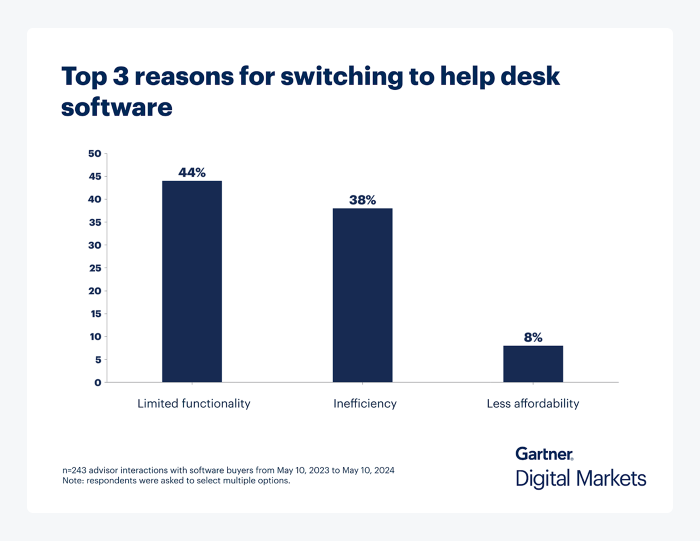
With that said, here are four key benefits of help desk and customer service software for small business:
Increased customer and employee retention
Customers want fast, accurate support. In fact, over 73% of consumers[2] will switch to a competitor after multiple bad experiences. A small business help desk tool reduces wait times, keeps conversations organized, and lets agents deliver consistent answers, no matter who picks up the ticket.
It helps employees, too. Reps don’t burn out switching between tools or digging for past conversations. They stay focused and productive. That means less churn and lower hiring costs.
Did you know that…
Gartner forecasts[3] that by 2026, conversational AI deployments within contact centers will reduce agent labor costs by $80 billion.
Lowered operational costs
Support teams waste hours manually sorting tickets or answering the same questions over and over. Customer service desk platforms automate routing, use AI to handle common queries, and give managers clear dashboards to spot problems before they escalate.
The results include fewer mistakes and more efficient support representatives.
Read more: Learn what email automation is and how it can help your SMB.
Better functionality and unified data
Customer data scattered across email, chat, and spreadsheets leads to missed context and double-work. This is where small business help desk software comes in. It brings all communication into one timeline. Agents see the full history (think purchases, past issues, chat logs, etc) without switching tabs.
This isn’t just convenient. It shortens resolution times and improves customer satisfaction.
Did you know that…
Lyro AI is an award-winning AI agent that achieves an industry-leading resolution rate, averaging 64% and peaking at 90%.
Greater visibility and insight
You can’t fix what you can’t see. Help desk platforms track key help desk metrics like resolution time, ticket volume, and agent performance. This makes it easy to spot what’s working and where to optimize.
Need to justify more headcount? Show the ticket surge in real numbers. Want to prove AI is helping? Show the drop in response time.
Top 10 best help desk software for small business to consider
There are hundreds of help desk tools out there, but most are built for big teams with deep pockets. This list focuses on help desk platforms and customer service software for small businesses: simple setup, smart automation, and real support value from day one.
Each tool here brings something different; whether it’s AI chat, multichannel customer service, or ticketing that scales without the bloat. Let’s break down what matters and who each one is best for.
| Name | Rating | Free plan? | Best for |
| Tidio | 4.7/5 ⭐️ | ✅ | AI agents and NLP chatbots |
| Salesforce Small Business Service | 4.4/5 ⭐️ | 30-day free trial | Native sales CRM integration |
| Front | 4.7/5 ⭐️ | 14-day free trial | Inbound sales |
| Hiver | 4.6/5 ⭐️ | 7-day free trial | Google Workspace integration |
| HubSpot Service Hub | 4.4/5 ⭐️ | ✅ | Ticket segmentation |
| SolarWinds | 4.3/5 ⭐️ | 30-day free trial | IT use cases |
| Gorgias | 4.6/5 ⭐️ | Free trial | Ecommerce use cases |
| Zoho Desk | 4.6/5 ⭐️ | 15-day free trial | Multiple third-party integrations |
| Help Scout | 4.4/5 ⭐️ | Free trial available | Shared team inbox |
| Jira Service Desk | 4.2/5 ⭐️ | 7-day free trial | Atlassian integration |
1. Tidio
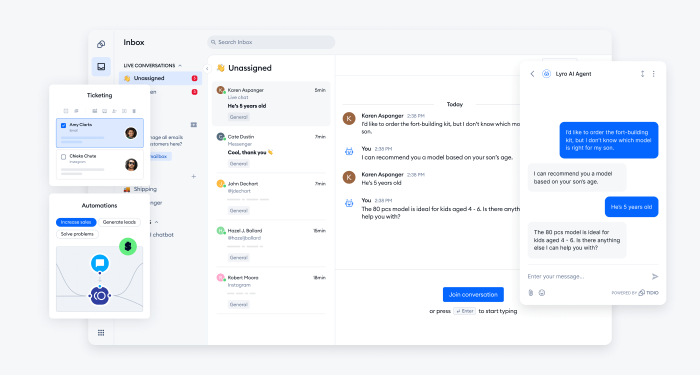
Ratings: 4.7/5 ⭐️ (1,740+ reviews)
The Tidio help desk platform is a flexible solution built for small businesses that need to support customers fast, without adding headcount. It combines the benefits of live chat, multichannel inboxes, and AI chatbot automation, with being among the best ticketing systems for small businesses, in one clean interface.
Lyro, Tidio’s AI agent for customer service, can resolve up to 70% of common customer questions instantly, helping lean teams cut down response times and stay available 24/7 without burning out.
“At present, about 90% of conversations are handled by Lyro, and in the vast majority of cases, the responses have been perfect,” – Max Sealey, Support Services Manager @ Gecko Hospitality.
Designed with ease of use in mind, Tidio requires little to no technical setup. It integrates with Shopify, WordPress, and popular CRMs, making it a smart fit for ecommerce stores, SaaS startups, and service providers.
Main features:
- AI agents and chatbots
- Multichannel support
- Help desk workflow automation
- Ticketing management
- Service level agreements (SLAs)
- Tidio canned responses
Pricing:
- 7-day free trial available
- Free version available
- Starter ($24.17/mo)
- Growth (starts at $49.17/mo)
- Plus (starts at $749/mo)
- Premium (starts at $2999/mo)
Discover why Tidio is among the most used small business help desk tools today
Read more: Check out our comprehensive Lyro review and explore its pros, cons, features, and pricing.
2. Salesforce Small Business Service
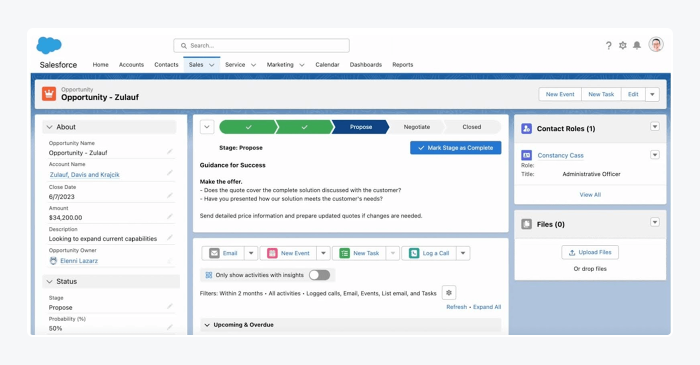
Ratings: 4.4/5 ⭐️ (5,600+ reviews)
Salesforce Small Business Service helps companies manage support requests and automate routine admin tasks. It lets users handle customer support and track tickets from channels like social media and live chat. However, as Salesforce focuses mainly on sales, its support features may not match those of dedicated help desk tools.
The platform includes CRM access for tracking sales pipelines, as well as case management tools that allow users to create, assign, and resolve customer issues. It also offers custom reports and dashboards to support data-driven decisions and improve customer service.
Main features:
- Omnichannel agent workspace
- AI chatbots
- Knowledge base
- Automated workflows
- Reporting and chatbot analytics
Pricing:
- Plans start at $25 per user/month.
- A 30-day free trial is available.
Read more: Find out who wins the Zendesk vs. Salesforce battle in this comprehensive software comparison.
3. Front
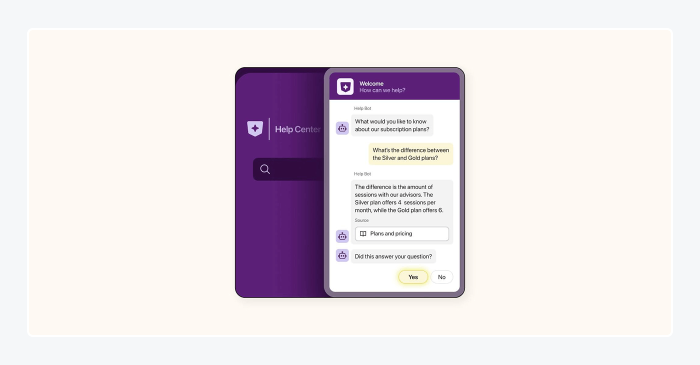
Ratings: 4.7/5 ⭐️ (2,200+ reviews)
Front helps teams manage customer communications—email, live chat, and SMS—in one place. Support staff can handle large volumes of requests using a shared view of each customer.
Team inboxes support collaboration, help desk templates ensure consistent replies, and automatic load balancing distributes tickets evenly. Front can also support inbound sales by automating lead routing and scheduling.
Main features:
- Omnichannel inbox
- Collaborative ticketing
- Workflow automation
- CRM integration
- Analytics & reporting
Pricing:
- Plans start at $19 per seat/month, billed annually.
- A 14-day free trial is available.
Read more: Discover the 10 best Front alternatives and competitors.
4. Hiver
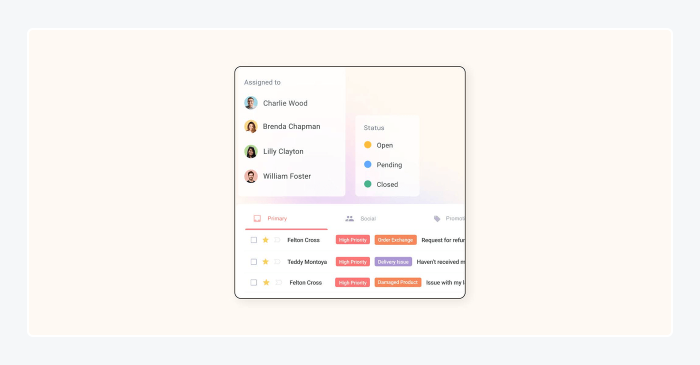
Ratings: 4.6/5 ⭐️ (1,100+ reviews)
Hiver is a help desk tool designed for Google Workspace. It works inside Gmail, helping teams manage customer emails, track interactions, and collaborate without leaving their inbox. Features like collision alerts, shared drafts, and internal notes support team coordination. The mobile app lets agents respond to customer queries while on the move.
Main features:
- Shared inboxes
- Email assignments
- Collision detection
- Automation and SLA management
- Analytics and reporting
Pricing:
- Paid plans start at $19 per user/month.
- A free plan and a 7-day free trial are available.
Read more: See which Hiver alternatives are great for team collaboration.
5. HubSpot Service Hub
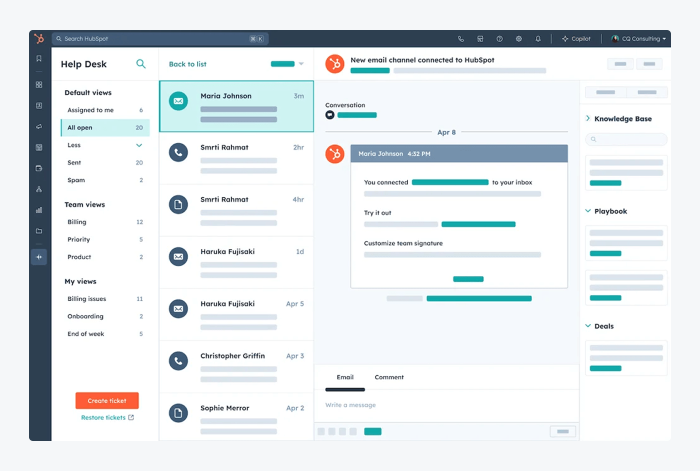
Ratings: 4.4/5 ⭐️ (2,500+ reviews)
HubSpot’s help desk, part of the Service Hub, offers ticketing, customer feedback, and a knowledge base for self-service. Teams can segment tickets by region or brand using pipelines for better organisation.
Service Hub also helps service teams track customer conversations and manage support requests. It includes features like automated ticket routing, SLA management, and performance tracking.
Main features:
- Ticketing system
- Knowledge base
- Live chat & conversational bots
- Customer feedback surveys
- Reporting & analytics
Pricing:
- Paid plans start at $15 per user/month, billed annually.
- A free plan is available.
Read more: Learn which HubSpot alternatives to look for in 2025.
6. SolarWinds
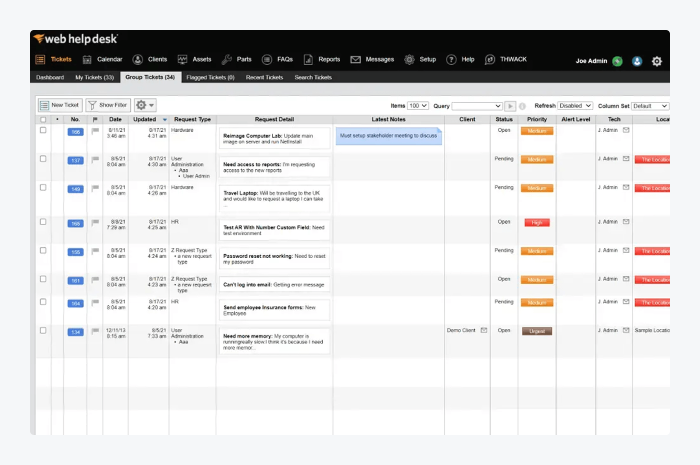
Ratings: 4.3/5 ⭐️ (740+ reviews)
SolarWinds Service Desk is an ITSM tool designed to help organisations manage IT support. It includes features for tracking, prioritising, and resolving incidents, as well as tools for managing IT assets throughout their lifecycle.
The platform allows for custom roles and permissions to control access and improve workflows. Another cool thing is that dashboards provide real-time KPI tracking and support SLA management, ensuring service standards are met.
Main features:
- Ticket management
- Automation rules
- Knowledge base
- SLA management
- Reporting & analytics
Pricing:
- Paid plans start at $39 per technician/month
- Free tools and a 30-day free trial are available
7. Gorgias
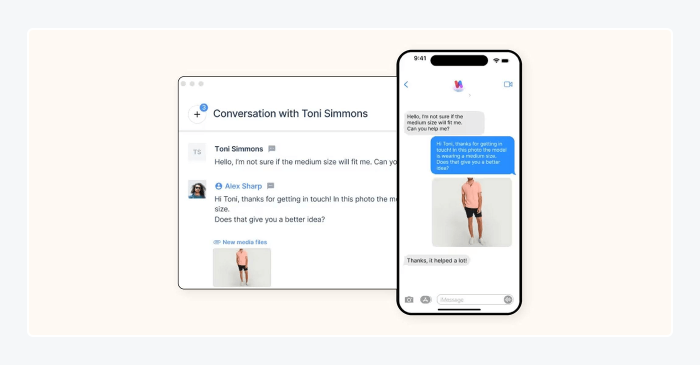
Ratings: 4.6/5 ⭐️ (500+ reviews)
Gorgias offers small business service software designed for the ecommerce sector. It integrates with major ecommerce platforms such as Shopify, allowing agents to view order details, issue refunds, and handle customer accounts directly from the help desk.
This platform also supports communication across multiple channels, so businesses can manage all customer interactions in one place. A unified customer profile provides data on customer behavior and preferences.
Main features:
- Omnichannel support
- Automated responses
- Intent and sentiment detection
- Shopify integration
- Macros and rules automation
Pricing:
- Plans start at $10 per month for 10 support tickets.
- A free trial is available.
Read more: Discover the top 10 Gorgias alternatives and competitors for ecommerce.
8. Zoho Desk
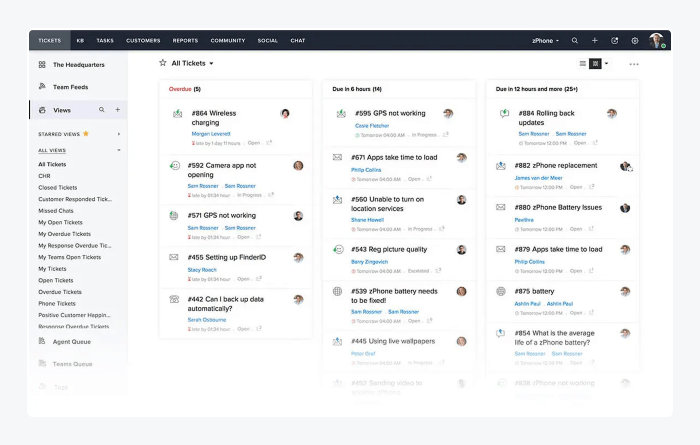
Ratings: 4.6/5 ⭐️ (6.400+ reviews)
Zoho Desk is known for its simplicity and solid customer support app features. Although its design is fairly basic, it offers a range of tools that suit various budgets, with practical features like an easy-to-use knowledge base for both staff and users.
One of its key features is top-tier reporting and analytics. It enables businesses to track performance through custom and agent dashboards, ticket summaries, and built-in reports.
Main features:
- Ticket management
- Multi-channel support
- Automation & workflows
- AI-powered Zia assistant
- Customizable dashboards & reports
Pricing:
- Plans start at $7 per user/month, billed annually.
- A free plan and a 15-day free trial are available.
Read more: Learn why these 11 Zoho Desk alternatives and competitors are worth looking into.
9. Help Scout
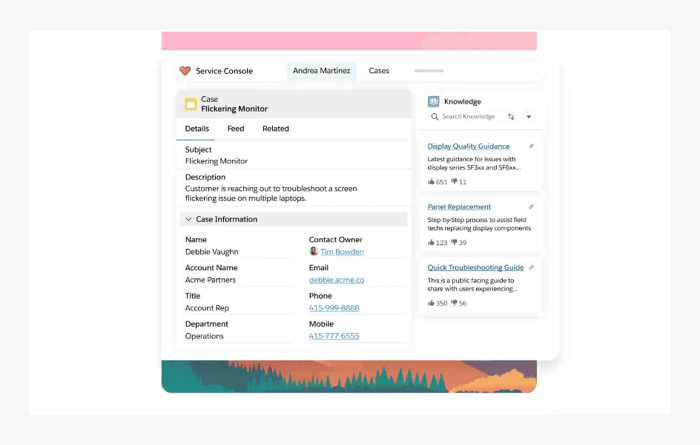
Ratings: 4.4/5 ⭐️ (400+ reviews)
Help Scout is a collaborative help desk tool suitable for both small and medium-sized businesses as well as larger enterprises with high-volume support teams. It offers features such as automated workflows, integrated documentation tools, a full knowledge base, and an API, which can be useful for ecommerce support.
One notable feature is the shared inbox that works across various social media channels, along with built-in live chat. Premium plans include a self-service portal and the option to integrate a chatbot using the API. Businesses can also track activity across multiple channels by generating custom reports.
Main features:
- Shared inbox
- Knowledge base
- Live chat
- Customer management
- Reporting & analytics
Pricing:
- Paid plans start at $50 per month.
- A free plan and a free trial are available.
Read more: Check out best Help Scout alternatives that you might find better suit your needs.
10. Jira Service Desk
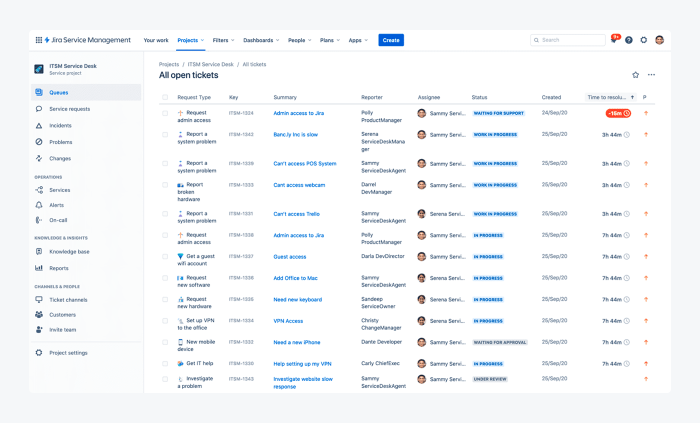
Ratings: 4.2/5 ⭐️ (780+ reviews)
Jira Service Desk is a reliable ITSM and SaaS help desk tool designed for business use. Developed by Atlassian and launched in 2013, it’s currently used by over 25,000 customers, with more than half using it to support their internal operations.
It’s suitable for various departments, including finance, IT, operations, and HR. The platform offers real-time reporting and templates that can be customized as needed.
Main features:
- Request management
- SLA management
- Automation rules
- Knowledge base integration
- Reporting and analytics
Pricing:
- Paid plans start at $23.80 per agent/month.
- A free plan and a 7-day free trial are available.
Read more: Learn the main differences between help desk and service desk platforms.
Key features to look for in help desk ticketing system software for small business
Typically, small business help desk software promises faster responses and better customer satisfaction. But not all deliver. Small businesses need lean, efficient platforms with no bloated system or long onboarding processes.
When evaluating digital customer service solutions for small business, look for:
Live chat and AI agents
Customers expect instant answers. Proactive live chat keeps them engaged on your site, while AI agents like Lyro handle basic queries 24/7. This cuts response time and frees human agents for more complex issues.
For example, Cove Smart streamlined customer support with Lyro AI, reducing response times by 80%, increasing resolution rates by 70%. Additionally, they boosted customer satisfaction by 35% while supporting multiple systems and languages.

Read more: Read the Cove Smart case study and learn how you can experience the same benefits with Lyro.
Multichannel support
Your customers don’t just email. They message on Facebook, Instagram, WhatsApp, and your website. A good service desk software for small business pulls all of your communication into one inbox. This way, agents can respond from a single dashboard, without logging in and out of platforms.
Read more: Learn how to create a WhatsApp chatbot in 8 steps.
Top-tier ticketing system
An automated ticketing system is the core of every small business help desk software. You need a clean ticket view, good ticket triage, auto-routing, status updates, and SLA tracking. Bonus if the software lets you prioritize high-value customers or flag VIP requests.
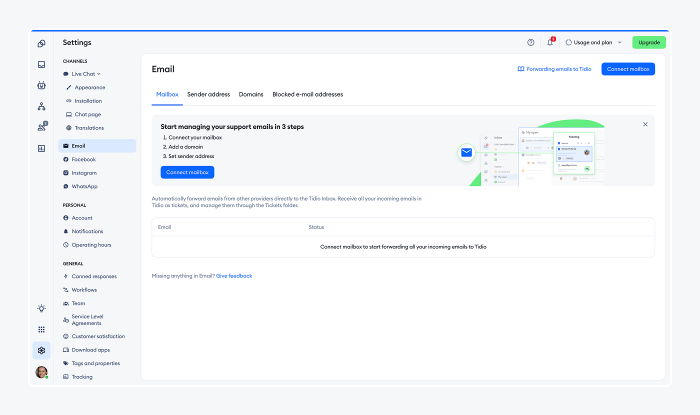
Read more: Find out which 9 essential help desk ticketing system features to look for.
Workflow automation
Small teams can’t scale without automation. Look for tools that let you automate repetitive tasks—assigning tickets, sending reminders, escalating after SLA breaches. This saves hours of repetitive labour and reduces human error.
Advanced analytics and reporting
You should be able to see how your team is doing in real time. Customer service metrics like average resolution time, ticket backlog, or first contact resolution rate help you make better staffing and training decisions.
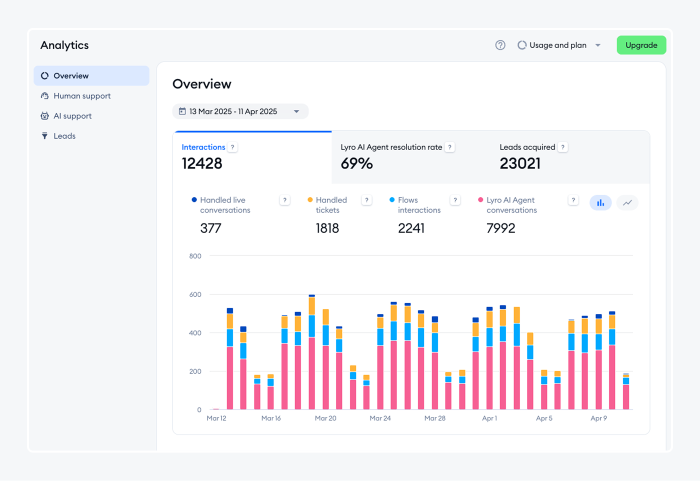
Read more: Discover which 12 key customer success metrics & KPIs to track.
Mobile accessibility
If your team works remotely or supports clients outside office hours, a mobile app is a must. Agents should be able to respond to tickets, update statuses, and view history from their phone.
Affordability and scalability
Don’t overpay for features you won’t use. But also make sure the platform can grow with you—whether that’s more agents, more channels, or deeper automation.
Try Tidio help desk software for small business
If you’re seeking the best customer service software for small businesses that is a practical, efficient, and scalable solution, Tidio offers a compelling option. Combining live chat, multichannel messaging, and AI automation, Tidio enables small teams to achieve up to 90% customer service automation. It helps deliver responsive and consistent support without the need for extensive resources.
Key benefits for SMB customer service:
- Automated support with Lyro AI: Tidio’s Lyro AI chatbot can handle up to 70% of common customer inquiries, allowing your team to focus on more complex issues.
- Rapid response times: Implementing Lyro has been shown to reduce first response times by up to 75%, enhancing customer satisfaction and engagement.
- Multichannel integration: Manage customer interactions across various platforms, including website chat, email, Facebook Messenger, Instagram, and WhatsApp, from a single, unified dashboard.
- User-friendly setup: Tidio’s intuitive interface and quick integration process mean you can have your small business help desk up and running with minimal technical expertise.
- Scalable solutions: With flexible pricing plans, including a robust free tier, Tidio accommodates the evolving needs of growing businesses.
Tidio’s comprehensive help desk features help numerous small businesses enhance their customer support capabilities, improve response times, and scale their operations effectively. All without overextending their resources.
Join one of the many businesses that use Tidio’s help desk functionalities and scale their support in a cost effective way!
Implement Tidio and Lyro AI agent to automate your help desk efforts like a pro
FAQs
The best help desk software for a small business is one that makes it easy to manage customer inquiries without overwhelming your team or budget. Popular options that small businesses frequently choose include Tidio, Help Scout, Freshdesk, and Zoho Desk. Different tools excel in different areas, so the right choice depends on what your team needs most.
Yes. Several help desk platforms offer free plans or entirely free software suited to small business needs. Tools like HubSpot’s free help desk ticketing, Freshdesk’s free tier with ticket management and automation, and others such as Zoho Desk offer ways to start handling support without paying upfront. Tidio also provides a free plan with help desk features, making it possible to begin managing customer tickets without an immediate financial commitment.
Tidio is an AI-powered customer service and engagement platform that blends live chat, chatbot automation, and help desk functionality into a single tool. It lets businesses centralize customer messages into one dashboard, automate routine interactions with chatbots, and manage support tickets efficiently.
Yes. Tidio is often recommended for small businesses, especially ecommerce brands. That’s because it combines essential help desk ticketing with live chat, automation flows, and easy-to-use AI tools. Many reviews highlight its all-in-one design and multichannel support as strengths for teams that want both ticket management and real-time engagement in one platform.
Yes. Tidio includes AI features, most notably the Lyro conversational AI chatbot that can handle common customer questions and automate responses using natural language. Beyond the chatbot, Tidio supports rule-based automation, and AI-assisted tools that help organize and prioritize incoming support messages to speed up response times.

